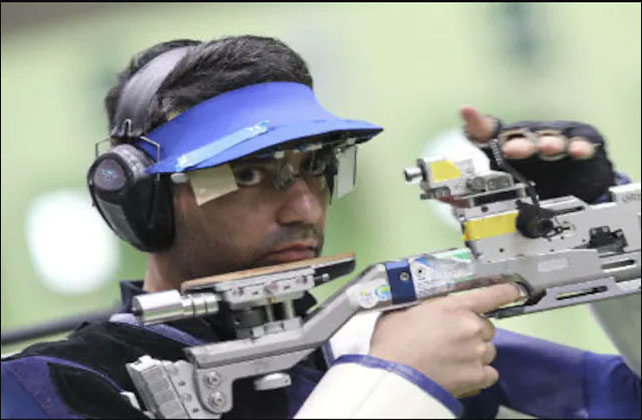Abhinav Bindra talks about pressure of shooting at the Olympics, how India’s young shooters could actually be at an advantage and more.
With the likes of Saurabh Chaudhary, Manu Bhaker, Divyansh Singh Panwar and Aishwary Pratap Singh Tomar among the ranks, the Indian shooting contingent at the Tokyo 2020 Olympics is expected to be one of the youngest ever from the nation to travel to a Summer Games.
But Abhinav Bindra, India’s only individual Olympic gold medallist to date, believes that the young age of some of India’s young marksmen could actually act to their advantage at the biggest stage of all.
“I don’t see the age of these youngsters as being any kind of a disadvantage (at the Olympics). I think it can only be an advantage. They’re young, they’re fearless. They go in with nothing to lose. That’s a nice, happy place to be in,” said Bindra.
The 37-year-old knows a thing or two about being in such a happy place. After all, when he competed at Sydney 2000 ― his first Olympics ― he was just 17 years of age. He, in fact, turned 18 while the Sydney Games were still on and missed out on making the cut for the 10m air rifle finals by just one point!
Bindra added that some of the youngsters, who have stamped their tickets for Tokyo 2020, have turned to him for advice from time to time.
“I’m very open to anybody who’s asked me for any help, but I will not actively go and give anyone help. I will not actively try and put something into their mind,” said Bindra, who was in Mumbai for the launch of Dreams of a Billion, a book about India’s journey at the Olympics, co-authored by Boria Majumdar and Nalin Mehta. “But if I’m asked, I’m more than happy to share my experiences. I don’t coach these youngsters or I don’t even tell them what to do.”
Bindra said that he instead tells the current crop of shooters about his own experiences of competing in five Olympics ― from Sydney 2000 to Rio 2016 ― and hopes they can gain some perspective out of the things he did wrong.
“At the end of the day, they have to find their way. They can’t just follow me and copy what I did and hope to succeed. They have to find their own path.”
Bindra’s performance consultant during his shooting career, Uwe Riesterer, used to have a theory that if you constantly told an American athlete that they were the best, they would walk into the arena wanting to kick everyone’s ass. But, Riesterer believed, tell an Indian that they’re the best, and they would immediately go on the defensive thinking they better not make a mistake.
With youngsters like Divyansh, Saurabh and Elavenil Valarivan having ended 2019 with the prestigious ISSF Golden Target Awards (given to shooters who finish the season with the World No 1 ranking), it will be interesting to see whether this crop of Indian shooters goes to Tokyo 2020 wanting to kick everyone’s ass or hoping to avoid mistakes. Even as he spoke at length about the need for shooters who were World No 1 to manage expectations, Bindra said he wasn’t sure if the Indian youngsters even felt any sort of pressure.
“If you’re World No 1, you’re the favourite going into a competition. It looks great on paper. But when you’re in that position, it’s also a challenge to be in that position. Being World No 1 doesn’t come with any freebies (going into a competition). It comes with the challenge of managing expectations, your own expectations more than anyone else’s. But maybe they don’t even face that challenge!”
In his journey through five Olympics, Bindra experienced every sort of pressure there was that could be humanly felt. At Sydney 2000, he was the teenaged rookie. At Athens 2004, he was one of the young favourites for gold. At Beijing 2008, he was a man still smarting from the disappointment from the previous Olympics. At London 2012, he was the defending champion. At Rio 2016, he was a man seeking one last hurrah.
“The pressure of an Olympics is totally different. The Olympics are so rare, they’re once in four years. And it is the most romanticised platform of sport. It’s only human to feel that pressure. I don’t think it’s really possible to ignore it completely.
“You can’t suppress that pressure, it will come. When you have to take the last shot for a gold medal at the Olympic Games, there will be a spike in your heart rate,” said Bindra, whose gold at Beijing 2008 came with a last shot of 10.8. “You have to learn to deal with it by being adaptable, by accepting it and not running away from that pressure. You have to almost you know basically accept it and suffer through it. It won’t kill you… it will be painful for a couple of hours, but it won’t kill you.”
From drinking yak milk to dry firing in dark rooms, from attaching electrodes to his brain to climbing 40-foot poles in Germany, Bindra tried everything that he thought could help him give him even a sliver of an edge over his rivals. But with just under four months remaining for the Tokyo Olympics, he said he wouldn’t recommend that any Indian shooter attempt to drag themselves out of their comfort zone in order to gain an advantage.
“With the Games just months away, trying something new doesn’t make sense to me. Sometimes keeping it simple is also a good thing.”


